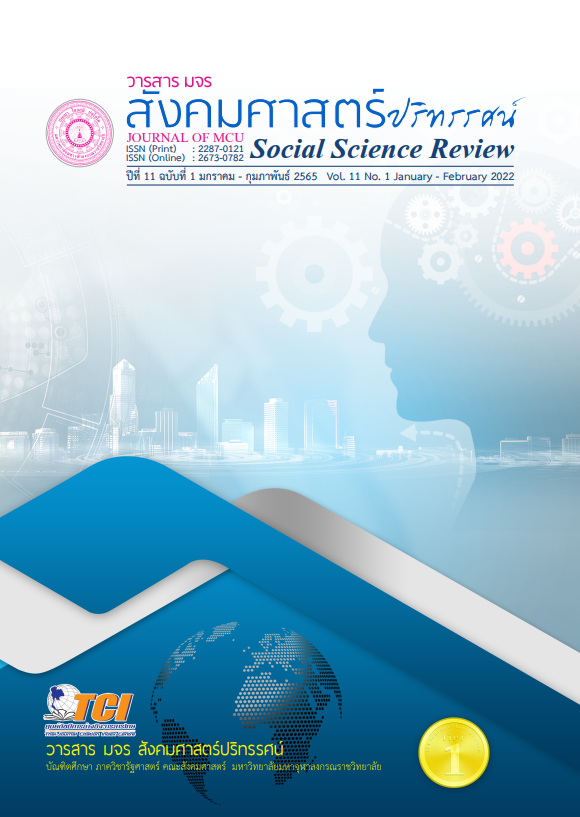การพัฒนาบุคลากรด้านการจัดซื้อจัดจ้างภาครัฐ ของหน่วยงานในสังกัดกระทรวงการคลัง โดยประยุกต์ใช้หลักพุทธธรรม
คำสำคัญ:
การพัฒนาบุคลากร, การจัดซื้อจัดจ้างภาครัฐ, หลักพุทธธรรมบทคัดย่อ
บทความวิจัยนี้มีวัตถุประสงค์เพื่อศึกษาหลักพุทธธรรมและปัจจัยที่ส่งผลต่อการพัฒนา และนำเสนอรูปแบบในการใช้หลักพุทธธรรม ในการพัฒนาบุคลากรด้านการจัดซื้อจัดจ้างภาครัฐ ของหน่วยงานในสังกัดกระทรวงการคลัง เป็นการวิจัยเป็นแบบผสานวิธี
ผลการวิจัยพบว่า 1. หลักพุทธธรรมส่งผลต่อการพัฒนาบุคลากร โดยภาพรวมพบว่า หลักอิทธิบาท 4 ส่งผลต่อการพัฒนาบุคลากร ในด้านฉันทะ ความพอใจในการใช้เทคโนโลยี ด้านวิริยะ มีความพยายาม ในการจัดทำแผน มีจิตตะ และวิมังสา ในการตรวจสอบคุณสมบัติของผู้ยื่นข้อเสนอ สร้างความเชื่อมั่น ในการปฏิบัติงาน 2. ปัจจัยที่ส่งผล ต่อการพัฒนาบุคลากร โดยภาพรวมพบว่า อิทธิบาท 4 ส่งผลต่อ การพัฒนาบุคลากรในระดับมาก คือ ด้านจิตตะ การยึดมั่นความถูกต้อง ด้านวิริยะ มีความพากเพียร ในการปฏิบัติงาน ด้านฉันทะ และด้านจิตตะ มีความพอใจ มีความเอาใจใส่ที่ทุกภาคส่วนร่วมตรวจสอบ และด้านวิมังสา ทบทวนตั้งมั่นในการปฏิบัติ 3. รูปแบบในการใช้หลักพุทธธรรม คืออิทธิบาท 4 ในการพัฒนาบุคลากร พบว่า 1) พัฒนางานที่ใช้เทคโนโลยี 2) พัฒนาในการทำแผน 3) การตรวจสอบคุณสมบัติผู้ยื่นข้อเสนอ 4) การให้ภาคประชาชนเข้าร่วมตรวจสอบ 5) การจัดซื้อพัสดุในราคาที่เหมาะสม 6) การวางแผน และประเมินผลได้สำเร็จ 7) การร่วมปฏิบัติงานกับทุกภาคส่วน
เอกสารอ้างอิง
กระทรวงการคลัง. (2563). บุคลากรภาครัฐ. สืบค้น 25 สิงหาคม 2563, จาก https://www.mof.go.th
คติยา อายุยืน. (2559). การพัฒนาทรัพยากรมามนุษย์ด้วยหลักพุทธธรรม เพื่อการพัฒนาองค์การที่ยั่งยืน. ธรรมทรรศน์, 16(2), 157.
ชาญวิทย์ พริกบุญจันทร์. (2564). การบริหารงานแบบมุ่งผลสัมฤทธิ์ตามแนวทางสังคหวัตถุธรรม ของสำนักงานประกันสังคมจังหวัดสมุทรสาคร. วารสารสหวิทยาการนวัตกรรมปริทรรศน์, 4(2), 42-56.
ทิพาวดี เมฆสวรรค์. (2546). พระราชบัญญัติระเบียบการบริหารราชการแผ่นดิน. กรุงเทพฯ: บริษัท พี.เอ.ลีฟวิ่ง จำกัด.
พระครูธรรมธรสุชาติ ฐิตวโร. (2558). การประยุกต์ใช้อิทธิบาท 4 เพื่อประสิทธิภาพการปฏิบัติงานในองค์กร. พุทธจักร, 69(2), 24.
พระครูวินัยธรอธิษฐ์ สุวฑฺโฒ. (2564). รัฐศาสตร์แนวพุทธ: วิเคราะห์ภาวะผู้นำทางการเมืองที่พึงประสงค์. วารสารสหวิทยาการนวัตกรรมปริทรรศน์, 4(2), 70-77.
พระชินกร สุจิตฺโต. (2564). หลักธรรมาธิปไตย: การแก้ปัญหาคอรัปชั่นในสังคมไทย. วารสารสหวิทยาการนวัตกรรมปริทรรศน์, 4(2), 78-88.
พิชิต อวิรุธาณิชย์. (2563). การบริหารทรัพยากรมนุษย์กับหลักอิทธิบาท 4. Journal of Liberal Arts, Prince of Songkla University, 12(1), 39.
สถาบันส่งเสริมการบริหารกิจการบ้านเมืองที่ดี. (2564). การพัฒนาคุณภาพการบริหารจัดการภาครัฐ. สืบค้น 25 สิงหาคม 2564, จาก https://www.opde.go.th
สำนักงบประมาณ. (2564). มาตรการเร่งรัดการใช้จ่ายงบประมาณรายจ่ายประจำปีงบประมาณ พ.ศ. 2564. สืบค้น 30 กันยายน 2563, จาก www.bb.go.th
สำนักพัฒนาระบบจำแนกตำแหน่งและค่าตอบแทน. (2553). คู่มือสมรรถนะหลัก. กรุงเทพฯ: บริษัท ประชุมช่าง จำกัด.
ดาวน์โหลด
เผยแพร่แล้ว
รูปแบบการอ้างอิง
ฉบับ
ประเภทบทความ
สัญญาอนุญาต
ลิขสิทธิ์ (c) 2022 วารสาร มจร สังคมศาสตร์ปริทรรศน์

อนุญาตภายใต้เงื่อนไข Creative Commons Attribution-NonCommercial-NoDerivatives 4.0 International License.
เพื่อให้เป็นไปตามกฎหมายลิขสิทธิ์ ผู้นิพนธ์ทุกท่านต้องลงลายมือชื่อในแบบฟอร์มใบมอบลิขสิทธิ์บทความให้แก่วารสารฯ พร้อมกับบทความต้นฉบับที่ได้แก้ไขครั้งสุดท้าย นอกจากนี้ ผู้นิพนธ์ทุกท่านต้องยืนยันว่าบทความต้นฉบับที่ส่งมาตีพิมพ์นั้น ได้ส่งมาตีพิมพ์เฉพาะในวารสาร มจร สังคมศาสตร์ปริทรรศน์ เพียงแห่งเดียวเท่านั้น หากมีการใช้ภาพหรือตารางหรือเนื้อหาอื่นๆ ของผู้นิพนธ์อื่นที่ปรากฏในสิ่งตีพิมพ์อื่นมาแล้ว ผู้นิพนธ์ต้องขออนุญาตเจ้าของลิขสิทธิ์ก่อน พร้อมทั้งแสดงหนังสือที่ได้รับการยินยอมต่อบรรณาธิการ ก่อนที่บทความจะได้รับการตีพิมพ์ หากไม่เป็นไปตามข้อกำหนดเบื้องต้น ทางวารสารจะถอดบทความของท่านออกโดยไม่มีข้อยกเว้นใดๆ ทั้งสิ้น





